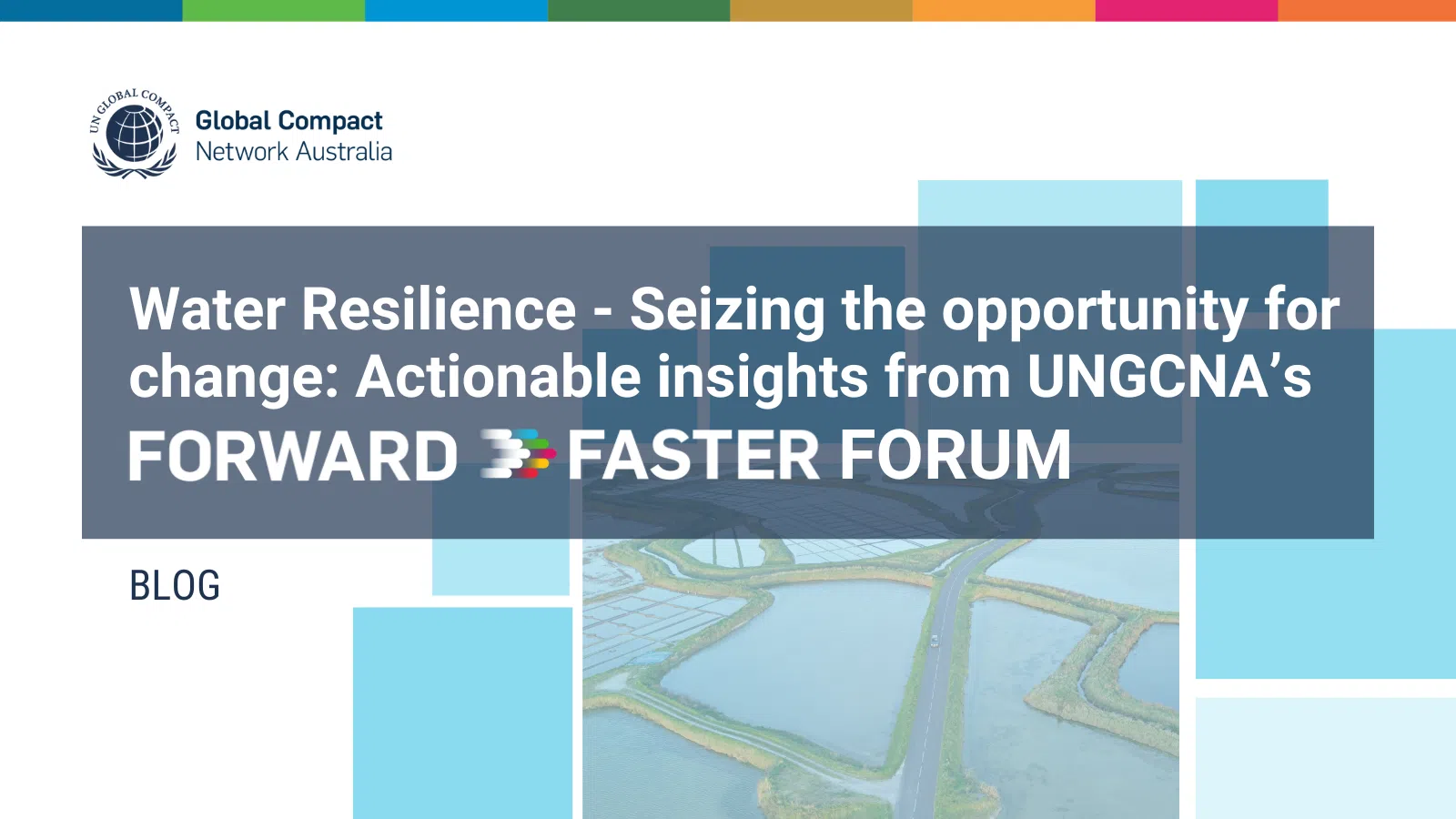
Blogs, Environment & Climate Change, Featured
BLOG | Water Resilience – Seizing the opportunity for change: Actionable insights from the UN Global Compact Network Australia’s Forward Faster Forum
UN Global Compact Network Australia | July 23, 2024
The global water crisis is urgent and water risk affects everything from economies to ecosystems. Right now, more than 2 billion people lack safe drinking water. It is estimated there will be a 40 per cent gap between available water and demand for water by 2030. The private sector has the ability to shape our most valuable resource and move the needle from water risk to water resilience.
The UN Global Compact Network Australia’s (UNGCNA) recent Forward Faster Forum, held before the National Banksia Sustainability Awards in Melbourne, brought together business leaders and change-makers to tackle water resilience – one of the five action areas of the UN Global Compact’s Forward Faster initiative.
The UNGCNA’s Forward Faster Forum – Water resilience panel:
- Evan Center, Senior Manager, Environment and Climate Change, UN Global Compact Australia
- Anne-Marie Kirkman, Global Program & Commercialization Lead, GHD
How will taking ambitious action in water resilience benefit your company?
Building water resilience at your organisation can improve business performance and accelerate growth.
Here are some of the benefits of setting targets for water resilience:
- Reduce potential business risks caused by water challenges (for example in your operations and supply chain).
- Support ecosystems that capture, filter and store water resources, while supporting biodiversity and helping to reduce the impacts of climate change.
- Build relationships both in the communities in which you operate and with your investors.
- Profoundly impact our ability to fulfil the UN Human Right to water and sanitation (HRWS) and broader Sustainable Development Goals.
Key takeaways
Here are three key takeaways from the session:
- Water crisis: A core aspect of climate change
Climate change is driving massive water-related issues like floods, droughts, sea-level rise, and ocean acidification, affecting billions worldwide. Unfortunately, 2 billion people lack clean water and sanitation access, highlighting a significant global challenge. Anne-Marie Kirkman, Global Program Manager at GHD, emphasised the significant role of water in the climate crisis. The recent IPCC report highlights the critical role of water in the climate crisis, with over half of global natural disasters being water related. Addressing water resilience requires re-evaluating how water resources are allocated across the agriculture, manufacturing, transportation, and energy sectors.
- Water management: Shifting from externality to priority
Water management is no longer marginal; it’s integral to business sustainability and resilience in the face of climate change. Ms Kirkman stressed that water, often seen just as a production cost, is fundamental to business and sustainability, especially in Australia, the driest inhabited continent.
In Australia, prioritising vulnerable basins like the Murray Darling Basin is crucial, given its significance to agriculture and the economy. Substantial economic losses due to climate-related water risk have a massive impact on agriculture, retail, manufacturing, banking, insurance, and energy sectors. Sectors such as banking and insurance also face consequences, as rising premiums post-disaster make businesses uninsurable.
The energy sector, reliant on water for various processes, faces risks due to the transition to renewable energy. Ms Kirkman emphasised, “We must move away from viewing water as merely a low-cost production element.” Understanding its critical importance to the supply chain is essential. Adopting a holistic and systemic approach to water within private sector is necessary for effective management.
- Respect for water: Advocating for sustainable practices
Water is a valuable resource, urging us to recognise and respect its significance. Considering this, discussions around the energy transition should also focus on low-carbon water solutions. Ms Kirkman pointed out the pivotal role of professionals in the engineering field in advancing practical solutions for sustainable water management. This includes the design and implementation of blue and green infrastructure solutions that work harmoniously with nature rather than relying solely on concrete-based approaches.
Ms Kirkman also emphasised the importance of supporting leadership from First-Nations led businesses and communities on water rights and resource issues: “Integrating Indigenous perspectives,” she explained “such as those advocated by Aboriginal elder Dr. Phil Duncan, is crucial for ensuring that our decisions align with the needs of future generations.” Following this call to action, she urged the prioritisation of sustainable water practices across all sectors of work and industries.
The UN Global Compact’s Forward Faster initiative
The UN Global Compact’s Forward Faster initiative was launched on 18 September 2023 and is a 7-year initiative focused on five areas of action where companies can make the biggest, fastest impact across the 17 Sustainable Development Goals by 2030.
The five areas of action are:
- Gender equality
- Climate action
- Living wage
- Finance and investment
- Water resilience.
As part of the UNGCNA’s Forward Faster Forum, the panel discussion on Water Resilience stressed the importance of both individual and collective action. The discussion underscored how companies can seize this opportunity to speed up progress and meet their sustainability goals. Companies committing to the water resilience target get support and resources from the CEO Water Mandate and the UN Global Compact. That’s where the Forward Faster initiative’s Water Resilience target comes in.
Water Resilience Target: Build water resilience across global operations and supply chains and join hands to achieve collective positive water impact in at least 100 vulnerable prioritised water basins by 2030.
Join the companies taking action
Is your company ready to move Forward Faster and take ambitious action? To join the companies taking action or to find out more about the UN Global Compact’s Forward Faster initiative go to: forwardfaster.unglobalcompact.org
Contributors:
Sunder Erdenekhuyag, Environment and Climate Change Intern, UN Global Compact Network Australia
Julia Bourke, Senior Coordinator, UN Global Compact Network Australia


